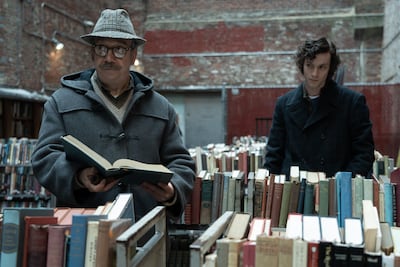When do you cry in a film? For me, it’s never in the bleakest moments. Rather, I usually find my eyes welling up when a tiny glimmer of light has fought its way through the darkness.
In The Holdovers, the latest Oscar-nominated collaboration between actor Paul Giamatti and director Alexander Payne, those beams are dazzling. Perhaps that’s why, in the months since its international release, the many who watched it seem to have forgotten the darkness was there at all.
Do a search around online, and you’ll often find it damned with the faint praise of "feel good".
Even rave reviews seem qualified in a way, treating its easy-to-digest nature as a sign that, while enjoyable and easy to recommend, this is not a work of substance.

The basic premise, of course, does sound a bit like an old made-for-television movie of the week. Set over the winter holiday break at Barton Academy, an elite all-male boarding school in the north-eastern United States, the story follows a group of boys forced to hold over on campus until the new year’s school term begins, and the adults responsible for keeping them safe.
Giamatti plays Paul Hunham, an alumnus of the institution turned curmudgeonly classics professor, set in his ways and full of resentment for the many privileges his students take for granted. Even though he’s dedicated his life to this place and rarely leaves campus, everyone there hates him, as he’s often reminded.
While we meet many of them in the opening, the movie doesn’t stay interested in the silver-spooned characters for very long. Soon into the film’s 133-minute runtime, only three lead characters remain – Hunham, cafeteria manager Mary Lamb (Oscar favourite Da'Vine Joy Randolph), and a troubled pupil, Angus Tully, played by newcomer Dominic Sessa.
Each of the three has been beaten down by their world in different ways. Lamb perhaps worst of all – her son Curtis was a star student at the school only a year earlier, only to die in the Vietnam War because he couldn’t afford to attend the university he’d been accepted to without the military’s support.
Death looms large. Tully is just as brilliant and free-spirited as Hunham must have been at his age. But when his family fell apart, he developed some anti-social tendencies, and his top marks have not saved him from being kicked out of school after school. It’s made clear that if this happens again, he may be doomed to the same fate as Curtis.

There’s so much loss surrounding these characters, and what’s lost is lost. Curtis will never come back from the dead. Tully’s father will never come back home, either. Hunham’s once-promising career might never be saved, and the love he so desperately seeks seems like a far-off dream, even by the end.
Over the course of the film, these characters do find respite in each other, but it never feels like a permanent bond. In moments, you’ll hope that maybe Hunham and Lamb will fall for each other, but more realistically they’ll go back to nodding politely in the hallway. Hunham and Tully may come to respect one another, but he’s not about to adopt him as his new-found son, either.
What we get instead are momentary acts of kindness that pull their gaze from the abyss they each feel pulled towards.
But the abyss remains.
“You can’t even dream a whole dream, can you?” Lamb asks Hunham at one point, a line that hangs in the air long after she utters it.
This is still ostensibly a Christmas movie, however. There’re big laughs and warm smiles. In a way, there’s still hope for each of them provided by the others’ helping hands, but the abyss remains.
The only help we have in avoiding it, the film implies, is in the small but constant acts of empathy for and by the people around us.
In a time when things often seem so hopeless, when the same forces of inequality and military injustices plague our own world, perhaps it’s this film’s realistic salve that makes it resonate so strongly.
We may not be able to fix any of this, but a little bit of love to the people around us, even the ones we may ignore, can go a long way for all of us. Perhaps we’ll get through it. We each have our own individual journeys to pull ourselves through, and no one is going to carry us through it. But we can do a lot to help others on their own paths, even with the smallest acts of kindness. At this point, can any of us ask for much more?
The Holdovers is in cinemas now across the UAE


